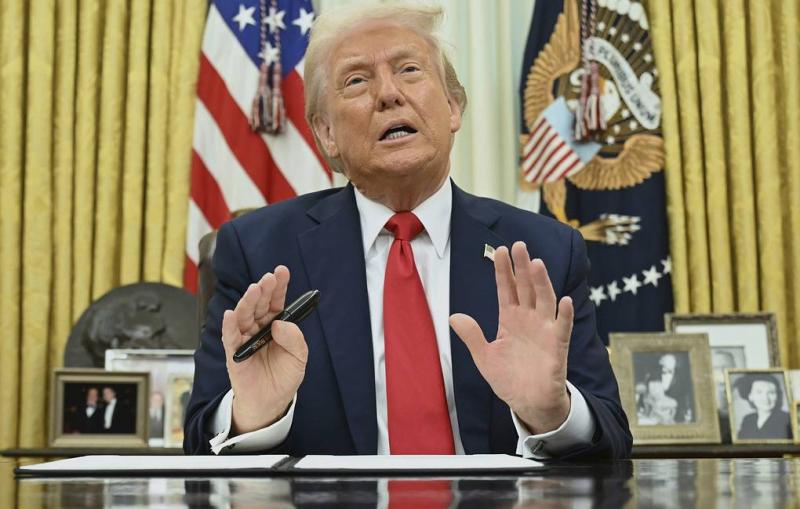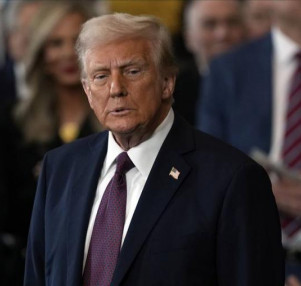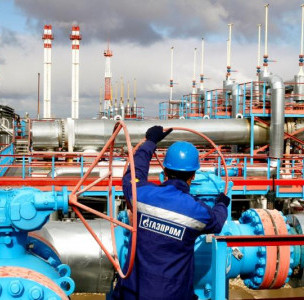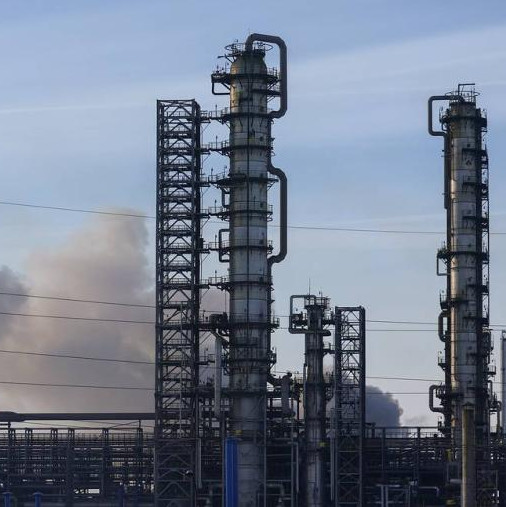
Europe and Ukraine undermine the US peace plan; Washington seeks a return to Libya; and Donald Trump begins to ease off in the tariff war with China. These stories have topped Thursday’s newspaper headlines across Russia, according to TASS news agency.
Media: Europe, Ukraine undermine US peace plan
Brussels and Kiev are trying to undermine US President Donald Trump’s plan to resolve the Ukraine crisis, said experts interviewed by Izvestia. The US was outraged by Vladimir Zelensky’s refusal to recognize the new territorial reality. The Americans decided not to send a high-ranking delegation to the talks that were set to take place in London on Wednesday. France, the UK, and Germany followed suit, reducing the level of their participation.
The Americans’ decision to downgrade the level of the London meeting from ministers to experts makes it clear that the coalition has rejected Trump’s plan even before the meeting, and is working on its own proposal, Tigran Meloyan, an analyst with the Center for Mediterranean Studies at the Higher School of Economics, pointed out.
Kiev and Europe’s refusal to accept Trump’s plan calls into question the future of the negotiation process. However, the US will not withdraw from it in the near future for two reasons, said Ivan Loshkaryov, associate professor with the Department of Political Theory at the Moscow State Institute of International Relations. First, there has been no progress on other international tracks, such as Greenland, the Gaza Strip, or the trade war with China, so Washington needs to make some clear achievements at least with regard to Ukraine. Second, the US is still keen on its strategic pivot to the Asia-Pacific region, which requires redirecting resources from other regions, including Europe. This will become possible after the Ukraine conflict is resolved, Loshkaryov elaborated.
The United States has found the counter-arguments presented by Kiev and Europe to be unacceptable, Dmitry Suslov, deputy director of the Center for Comprehensive European and International Studies at the Higher School of Economics, told Vedomosti. Still, he believes that if European and Ukrainian officials continue their resistance, the US is likely to once again suspend military aid to Ukraine, as it did in early March. "The current situation creates enormous risks both for Ukraine and Europe because without diplomatic and military support from the United States, Brussels will not be able to pay for the Ukrainian conflict, while Kiev’s path to defeat shorten dramatically," the expert concluded.
Nezavisimaya Gazeta: Washington seeks comeback in Libya
US Navy ships have paid a friendly visit to ports in western and eastern Libya for the first time in 56 years. According to US authorities, the goal was to demonstrate support for working with local partners. Later in the month, Washington plans to host the leaders of Libya’s conflicting parties. Such an approach may raise concerns for Russia, which has military and diplomatic assets in the country, Nezavisimaya Gazeta reports.
The African Corps, a separate unit of the Russian Armed Forces, operates in eastern Libya. Its deployment was completed in late 2023. However, Moscow pursues a neutral policy as Russia’s embassy in Tripoli was restored two years ago.
The United States’ activity in Libya looks all the more surprising because Africa is not on the list of priorities outlined by the Donald Trump administration.
Pavel Koshkin, senior researcher at the Russian Academy of Sciences’ Institute for US and Canadian Studies, explains that what the US is doing in Libya primarily shows that "in terms of strategically important issues, Trump consults with experts on the matter." "Despite his initially isolationist rhetoric, this step, which seems contradictory, looks logical within the US president’s framework," the expert noted. "Apparently guided by revanchist ideas, he seeks to restore the US to greatness by projecting his country’s influence on African nations as Russia and China have stepped up their activities on the continent. This is primarily a question of geopolitical prestige and competition with Moscow and China," he added.
Besides, in the expert’s words, increased interaction with Libya reflects Trump’s desire "to reestablish practical cooperation with certain players in the region where, in his view, the Democrats failed." Koshkin pointed out that Libyan leader Muammar Gaddafi had been overthrown under US President Barack Obama, and later, US Ambassador Christopher Stevens was killed in a terrorist attack in Benghazi. "This is why Trump sees the US return to the region as a symbolic move, aimed at correcting the mistakes of his predecessors," Koshkin concluded.
Vedomosti: Trump begins to ease off in tariff war with China
US President Donald Trump has made milder statements about the trade standoff with China. In particular, he announced that the current 145% tariffs on Chinese imports would come down, though not to the zero level, Vedomosti reports.
China’s reaction to what Trump said was not softer or more flexible than before. Chinese Foreign Ministry Spokesperson Guo Jiakun stated that "if the US really wants to resolve trade issues with China through dialogue and talks, it should abandon threats and coercion," and build relations on equality and respect. Chinese President Xi Jinping, in turn, said during talks with the Azerbaijani leader in Beijing that trade wars undermined the legal rights and interests of all countries, disrupting the global economic order.
Trump’s statement means an invitation to talks for the Chinese authorities, Vladimir Vasilyev, senior research fellow at the Russian Academy of Sciences’ Institute for US and Canadian Studies, observed. In his view, the White House is trying to downplay the tariff war in order to address its negative impact on the US economy. In a few days, the US statistics agency will publish economic data, which is likely to show a 2 to 3% decline in GDP. Rising tariffs may only exacerbate the US economic slowdown, the expert explained. The effective use of tariff tools enhanced economic growth during Trump’s first term, but the current policy was misguided in many respects, Vasilyev went on to say. In addition, the US administration simply overestimated its abilities and failed to calculate the potential consequences of its decisions, thus undermining the trust of financial institutions.
Trump’s apparent willingness to reduce tariffs on Chinese goods stems first and foremost from economic reasons, agrees Lev Sokolshchik, senior researcher with the Center for Comprehensive European and International Studies at the Higher School of Economics. Given the negative impact on the markets and rising inflation expectations, the White House must have decided to target tariffs on Chinese goods, Sokolshchik said. According to the analyst, Beijing’s unexpectedly tough behavior is another factor pushing Trump to bring tariffs down. However, even a major reduction of tariffs will not be able to remove fundamental contradictions between the US and China, and any thaw in relations should only be viewed as a temporary step back, Sokolshchik emphasized.
Rossiyskaya Gazeta: US, EU shift away from climate agenda in energy sector
The US seeks to remove or at least relax the climate-related restrictions on the energy sector that were introduced under former President Joe Biden and before him. This is primarily about permits for the mining of oil, gas, and coal, as well as for their use in the power generation sector and the chemical industry, Rossiyskaya Gazeta reports.
Meanwhile, the tariffs imposed by the new White House administration have started to affect the climate agenda in other countries. The European Union is being forced to rely on purchases of liquefied natural gas and oil from the US in order to avoid a trade war with Washington. In this regard, the Europeans will apparently have to reduce emissions requirements or even cancel the carbon tax for US energy.
Yevgenia Franke, senior analyst on the electric power industry at Eiler Analytical Technologies, believes that despite initiatives directed against the "green" agenda, neither the US nor the EU should be expected to change the structure of their plans to put generating facilities into operation. Today, it is often cheaper to use renewable energy, while coal-fired power stations are decommissioned for economic reasons, Franke explained. The opinion is shared by energy expert Kirill Rodionov, who even thinks that the use of energy coal for electricity generation will decline, while demand for coking coal for the steel industry will grow, including in the US and Europe. Russia will also be involved in the process and will be able to increase coking coal exports.
According to Valery Andrianov, associate professor at the Financial University under the Government of the Russian Federation, there are three reasons why interest in the green agenda is waning in the world in general and in Europe in particular. US President Donald Trump’s position on energy transition issues is the first reason. Second, the capacity of climate-related regulations and renewable energy was initially overstated. And finally, the general economic crisis is the third reason. As far as Europe goes, Trump’s tariffs are also playing a role, along with the EU’s move to drop Russian energy imports. Notably, energy transition is an incredibly costly process, which requires billions of euros. In short, its funding is clearly down, while hopes for success in the use of renewable energy haven’t grown stronger.
These shocks will have little impact on Russia. An official at the Ministry of Natural Resources confirmed to the newspaper that the energy agenda remained one of the country’s priorities.
Kommersant: Russia set to boost production, export of fertilizers
Russia is expected to substantially increase the production and export of mineral fertilizers by 2030. According to the Implementa company’s estimates, the majority of export supplies will be carried out through the Baltic Sea, Kommersant reports.
Implementa points out that Russian fertilizer exports may grow by 15 million metric tons, or 38%, from 40 million tons in 2024, mainly due to the supplies of carbamide and potassium chloride. According to experts, Russian chemical manufacturers remain competitive on the global market due to low production costs, even amid high logistics costs.
The Baltic Sea is the most promising route for exports, Implementa Director Dmitry Akishin observed. However, it already faces a lack of transport capacity, so a number of producers have to export fertilizers by train to China or use container terminals on the Baltic Sea.
According to Implementa, the designated capacity of terminals on the Baltic Sea falls short of the necessary level, and the unmet need may grow by 2030. Meanwhile, experts predict an infrastructure imbalance in ports on the Sea of Azov and the Black Sea. They say that growing fertilizer consumption in Asian markets and a potential lack of trans-shipment facilities on the Baltic Sea create conditions for the development of infrastructure in southern Russia.
Analysts at Gazprombank’s Center for Economic Forecasting largely agree with Implementa’s arguments. They expect that fertilizer production will go up by another 12 million tons by 2030, while exports will rise by 7-8 million tons. "Historically, the way Russian fertilizer plants are located makes it more reasonable for most companies to transport them through Baltic Sea ports," the center’s expert Nina Adamova explained. "However, given the diversity of distribution channels for Russian fertilizers, the southern and eastern directions also look interesting, especially for the companies based in the country’s center and south," she added. The expert also highlighted the need to align the development of port and rail infrastructure.
TASS is not responsible for the material quoted in these press reviews









